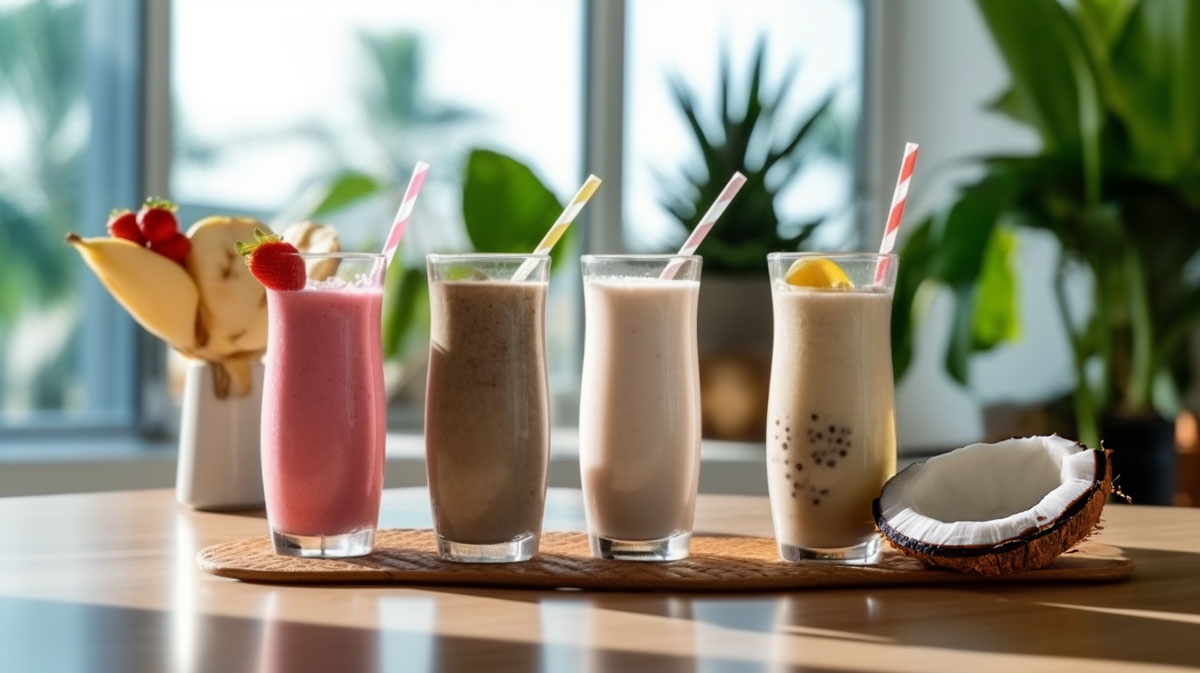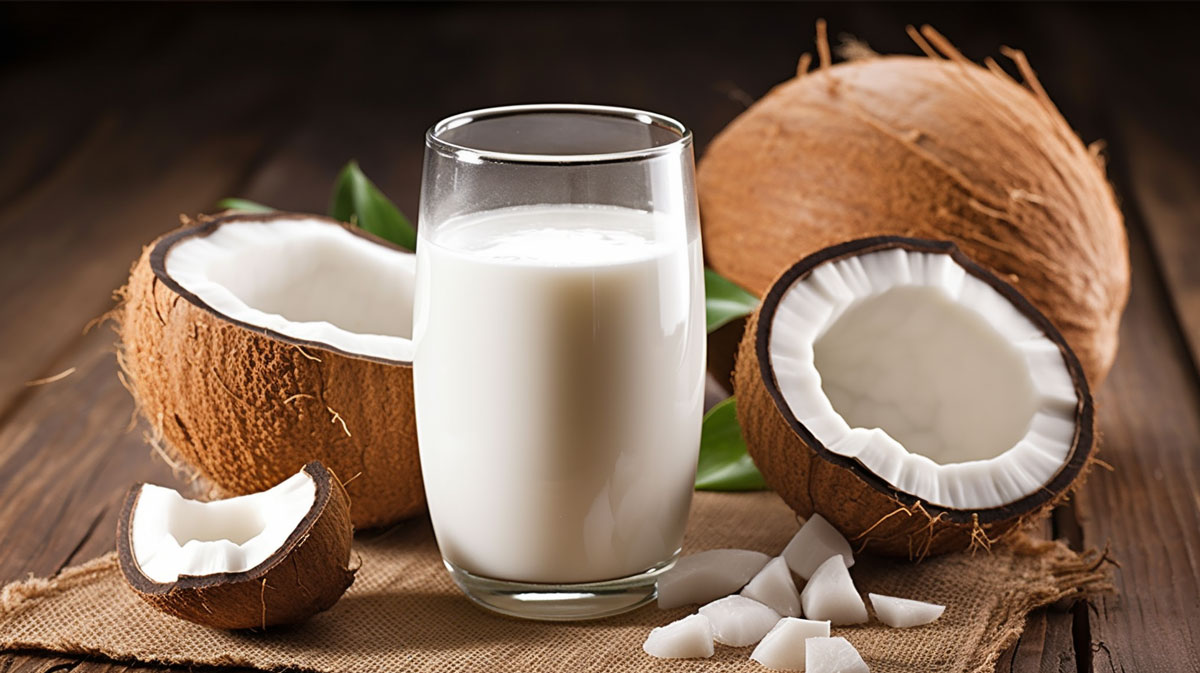“Is coconut milk good for you?” is a question many health-conscious individuals ask, especially with the rise of plant-based diets. Coconut milk, a creamy and aromatic liquid extracted from the white flesh of mature coconuts, has become a staple in many kitchens worldwide. Its versatility in both sweet and savory dishes, combined with its touted health benefits, has made it a popular choice. But with so many milk alternatives available, from almond to soy, where does coconut milk stand in the health spectrum? Is it the healthiest choice, or just a tropical fad?

Nutritional Profile of Coconut Milk
When considering if coconut milk is beneficial for health, it’s essential to understand its nutritional makeup. Its primary component, medium-chain triglycerides (MCTs), is known for its unique metabolic properties. Unlike other fats, MCTs are more efficiently converted into energy, potentially aiding in weight management.
However, it’s essential to differentiate between the various types of coconut milk products available:
-
Canned Coconut Milk: Typically used in cooking, it’s rich and creamy, containing higher fat content. It’s an excellent source of vitamins and minerals, including magnesium, potassium, and phosphorous.
-
Coconut Milk Beverages: These are more diluted and often found in cartons. They might be fortified with vitamins like B12 and D2 but generally have a lower nutrient density than their canned counterparts.
-
Coconut Cream: This is a thicker, more concentrated version of coconut milk, often used in desserts and rich sauces.

Health Benefits of Coconut Milk
Heart Health: The debate around the health benefits of coconut milk, especially concerning heart health, centers on its saturated fat content. Some studies suggest that the lauric acid in coconut milk might have a neutral or even beneficial effect on cholesterol levels.
Antioxidant Properties: Another reason why coconut milk is considered healthy is its rich antioxidant content. These antioxidants can help protect against cellular damage.
Immune Support: The lauric acid in coconut milk has antimicrobial properties, potentially supporting the immune system by warding off bacterial infections.
Read Full article about Health benefits of Coconut milk here.

Coconut Milk in Cooking and Dietary Choices
Coconut milk’s creamy texture and distinct flavor make it a favorite in many culinary traditions. From the spicy curries of Thailand to the sweet desserts of the Caribbean, coconut milk has found its way into a myriad of dishes.
Sweet Delights: Coconut milk is a star ingredient in many desserts. Its natural sweetness enhances treats like panna cotta, rice pudding, and tropical smoothies. When combined with fruits like mango or pineapple, it creates a symphony of flavors that’s hard to resist.
Savory Dishes: In savory dishes, coconut milk acts as a base for many curries, soups, and stews. It pairs well with spices like turmeric, cumin, and lemongrass, bringing a depth of flavor that’s both rich and comforting.
Dietary Alternatives: For those following a plant-based or lactose-free diet, coconut milk serves as an excellent alternative to dairy. It can easily replace cow’s milk in recipes, be it in baking, cooking, or beverages like coffee and tea.

Risks and Considerations
While there are many health benefits of coconut milk, it’s essential to be aware of certain considerations. Its high saturated fat content requires mindful consumption.
Caloric Content: Coconut milk, especially the canned variety, is calorie-dense due to its high fat content. It’s crucial to factor this in if you’re monitoring your caloric intake.
Saturated Fats: As mentioned earlier, coconut milk is rich in saturated fats. While some studies suggest these fats from coconut might not be as harmful as once believed, it’s still recommended to consume them in moderation.
Nutrient Imbalance: If you’re using coconut milk as a complete replacement for dairy, you might miss out on certain nutrients like calcium and vitamin D, unless you opt for fortified versions.
Allergies: While rare, some individuals might be allergic to coconut products. It’s essential to be cautious and consult with a healthcare professional if you suspect an allergy.

Making the Right Choice: Buying Coconut Milk
When shopping for coconut milk, the variety can be overwhelming. Here are some tips to make an informed choice, ensuring you reap the health benefits of coconut milk:
Check the Ingredients: Opt for products with minimal additives. Pure coconut milk should ideally contain coconut and water.
Avoid Added Sugars: Some coconut milk beverages might contain added sugars. Always check the nutrition label.
Consistency Matters: If you’re looking for coconut milk for cooking, canned versions are usually thicker and richer. For a lighter option, especially for cereals or beverages, carton varieties might be more suitable.
Organic and Ethical Choices: If possible, choose organic coconut milk. Some brands also offer ethically sourced products, ensuring that the farmers are paid fairly and the environment is respected.
Frequently asked questions
Is coconut milk actually healthy?
Yes, coconut milk is healthy when consumed in moderation. It provides essential nutrients and has properties that can support weight management, heart health, and immunity. However, like all foods, it’s essential to consume it as part of a balanced diet.
Is it OK to eat food with coconut milk every day?
While coconut milk can be a nutritious addition to one’s diet, it’s crucial to consume it in moderation due to its high saturated fat content. If incorporated daily, it’s essential to balance it out with other nutrient-rich foods and monitor overall saturated fat intake.
Which is better: almond milk or coconut milk?
Both almond milk and coconut milk have their unique nutritional profiles and benefits. Almond milk is typically lower in calories and fat than coconut milk and is often fortified with calcium and vitamin D. Coconut milk, on the other hand, is richer in MCTs and certain minerals. The choice between the two often comes down to individual nutritional needs, dietary preferences, and taste.
In conclusion, coconut milk is a versatile and nutritious addition to one’s diet. While it offers numerous health benefits, it’s essential to consume it mindfully, considering its high saturated fat content. Whether you’re sipping it in a tropical smoothie, enjoying it in a spicy curry, or pondering its health benefits, coconut milk undoubtedly brings a touch of the tropics to your plate and palate.






0 Comments